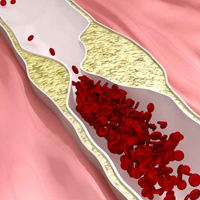Metabolic Dyslipidemia Linked to CHD Risk in Diabetes Adults, Study Finds
Jamal Rana, MD, Oakland, CA, presented research results on metabolic dyslipidemia and the risk of coronary heart disease (CHD) in adults with diabetes and low LDL-cholesterol.

Jamal Rana, MD, Oakland, CA, presented Saturday, March 14, at the 2015 American College of Cardiology annual meeting in San Diego, CA, results from his research on metabolic dyslipidemia and the risk of coronary heart disease (CHD) in adults with diabetes and low LDL-cholesterol.
While the risk of future CHD among individuals afflicted with diabetes and ‘metabolic dyslipidemia’ (high triglycerides [TG] and low HDL-C levels) consistently remains a pressing issue to researchers, there is only very limited data concerning the risk of CHD for this phenotype with LDL-C levels <100 mg/dl.
Rana and his team analyzed a total of 28,318 members, ages 30-90 years) of Kaiser Permanente Northern California afflicted with diabetes from 2002-2011 with low LDL-C levels (<100 mg/dl) and without reported CHD. Their primary concern was to compare the incidence and hazard ratios (HRs) for CHD events within 4 groups: “normal HDL and normal TG (reference); normal HDL and high TG (≥150 mg/dl); low HDL (≤50 mg/dl for women and ≤40 mg/dl for men) and normal TG; and low HDL and high TG (metabolic dyslipidemia)”.
Research indicated that 12,508 (44%) had metabolic dyslipidemia. Furthermore, age-adjusted CHD events/1000 person years (p-y) were highest among this subgroup (12.7/1000 p-y and 19 /1000 p-y for women and men, respectively).
Additionally, following a multivariable adjustment, Rana and his team observed a significant increased CHD risk in both women (HR 1.30, 95% CI: 1.1-1.5) and men (HR 1.48, 95% CI: 1.3-1.67) with metabolic dyslipidemia.
They noted the increased risk remained significant even after additionally adjusting for statin use.
Research results supported the team’s initial hypothesis that “metabolic dyslipidemia in diabetes-stricken adults is associated with an increased risk of CHD, even in individuals with a LDL-C < 100”. As such, the team understands the immediate necessity for effective CHD prevention strategies to address this high risk diabetes subset.